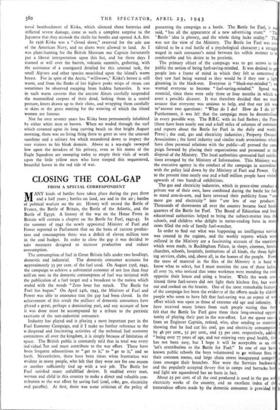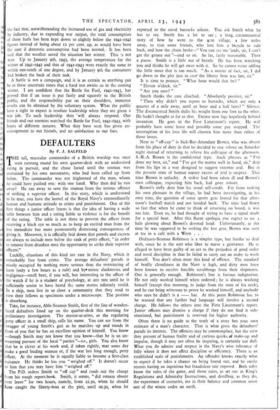CLOSING THE COAL-GAP
FROM A SPECIAL CORRESPONDENT
MANY kinds of battles have taken place during the past three and a half years ; battles on land, sea and in the air ; battles of political warfare on the air. History will record the Battle of France, the Battle of Britain, the Battle of the Atlantic, and the Battle of Egypt. A history of the war on the Home Front in Britain will contain a chapter on the Battle for Fuel, 1942-43. In the summer of 1942 the newly appointed Minister of Fuel and Power reported to Parliament that on the basis of current produc- tion and consumption there was a deficit of eleven million tons in the coal budget. In order to close the gap it was decided to take measures designed to increase production and reduce consumption.
The consumption of fuel in Great Britain falls under two headings, domestic and industrial. The domestic consumer accounts for approximately 33 per cent. of the fuel used. On August 23rd, 1942, the campaign to achieve a substantial economy of not less than four million tons in the domestic consumption of fuel was initiated with the publication of a fuel target and a broadcast to the nation which ended with the words "Zero hour has struck. The Battle for Fuel has begun." On April 14th, 1943, the Minister of Fuel and Power was able to announce that the gap had been closed. In the achievement of this result the millions of domestic consumers have played a great, perhaps a dominating part, and any account of how it was done must be accompanied by a tribute to the patriotic exertions of the non-industrial consumer.
Industry has played and is playing a most important part in the Fuel Economy Campaign, and if I make no further reference to the widespread and fascinating activities of the technical fuel economy committees all over the kingdom, it is simply because of limitation of space. The British public is constantly told that in total war every incrvidual an and must contribute to the war effort. There have been frequent admonitions to " get to it," to " go to it," and so forth. Nevertheless, there have been times when frustration was evident in many people, who felt that they were not for one reason or another sufficiently tied up with a war job. The Battle for Fuel satisfied many unfulfilled desires. It enabled every man, woman and child in this country to make a direct and valuable con- tribution to the war effort by saving fuel (coal, coke, gas, electricity and paraffin). At first, there was some criticism of the policy of
presenting the campaign as a battle. The Battle for Fuel, it is, said, " has all the appearance of a new advertising stunt." " ` Battle ' idea is phoney, and the whole thing lacks reality." was not the view of the Ministry. The Battle for Fuel was con sidered to be a real battle of a psychological character ; a struggl waged in each consumer's mind between his selfish instinct to comfortable and his desire to be patriotic.
The primary object of the campaign was to get across to di public the notion of being fuel-saving-minded. It was desired to g people into a frame of mind in which .they felt as concerned they saw fuel being wasted as they would be if they saw a ligh gleaming in the black-out. Everyone is " black-out-minded "; w wanted everyone to become " fuel-saving-minded." Speed w essential, since there were only three or four months in which t avert a possible disaster. It was therefore decided that we mus assume that everyone was anxious to help, and that our job Wa to'answer two questions: " What do I do? How do I do it? Furthermore, it was felt that the campaign must be decentralis in every possible way. The B.B.C. with its fuel flashes ; the Pres (there have been nearly one and a-half miles of columns of comment and reports about the Battle for Fuel in the daily and weekly Press) ; the coal, gas and electricity industries ; Property Owners' Associations ; the hotel industry and similar trade associations whit have close personal relations with the public—all pressed the cam paign forward by placing their organisations. and personnel at th disposal of the Ministry. The local authorities sponsored fuel exhibi- tions arranged by the Ministry of Information. This Ministry was the executive agency in the conduct of the campaign in accordance with the policy laid down by the Ministry of Fuel and Power. U to the present time nearly one and a-half million people have visit upwards of two hundrad exhibitions.
The gas and electricity industries, which in peace-time conduct private war of their own, have combined during the battle for fu to stand arm-in-aim, and have reversed their publicity from " u more gas and electricity " into " use less of our products. Thousands of showrooms all over the country became local head quarters of the Battle for Fuel. The Board of Education and 1 educational authorities helped to bring the subject-matter into th schools, and children who delight in meter-reading have in man cases filled- the role of family fuel-watcher.
In order to find out what was happening an intelligence servic was created in the regions, and the weekly reports which wer collated in the Ministry are a fascinating account of the exertion which were made, in Buckingham Palace, in shops, cinemas, hotels, churches, schools, hospitals, institutions of all kinds, the three fight- ing services, dubs, and, above all, in the homes of the people. Fr the mass of material in the files of the Ministry it is hard I know what to select, but I must mention the case of three ladies all over 7o, who noticed that some workmen were mending the road opposite their house and using a brazier. While the work con- tinued these fuel-savers did not light their kitchen fire, but went out and cooked on the brazier. One of the most remarkable features of the campaign has been the evidence of the efforts made by elder! people who seem to have felt that fuel-saving was an aspect of wa effort which was open to those of extreme old age and infirmity. have received many letters from such people stating that the felt that the Battle for Fuel gave them their long-awaited oppor tunity of playing their part in the war-effort. Let me quote one from an Engineer Captain, retired, who, after sending us statist showing that he had cut his coal, gas and electricity consumpti by 46 per cent., 52 per cent., and 53 per cent. respectively, add " being over 77 years of age, and not enjoying very good health, thi has not been easy, but I hope it will be acceptable as an 01 'un's contribution to the Battle for Fuel." In one of our best known public schools the boys volunteered to go without fires their common rooms, and large chain stores inaugurated compe tions amongst their branches. Nor were the Services backwar and the popularly accepted theory that in camps and barracks hea and light are squandered has no basis in fact.
About 25 per cent, of all the coal produced is used in the gas electricity works of the country, and as excellent index of th tremendous efforts made by the domestic consumer is provided b
the fact that, notwithstanding the increased use of gas and electricity by industry, due to expanding war output, the total consumption of these fuels has been kept down to slightly below the 1941-1942 figures instead of being about 12 per cent. up, as would have been the case if domestic consumption had been normal.. It has been
said that the weather saved the situation last winter. This not true. Up to January 9th, 1943, the average temperature for the winter of 1941-1942 and that of 1942-1943 were exactly the same to within one-tenth of one degree, and by January 9th the consumers had broken the back of their task.
A battle is not a campaign, and it is as certain as anything can be m these uncertain times that a hard test awaits us in the coming winter. I am confident that the Battle for Fuel, 1942-1943, has proved that if an issue is put fairly and squarely to the British public, and the responsibility put on their shoulders, immense results can be obtained by the voluntary system. What the public have a right to expect is resolute leadership when they are given a war job. To such leadership they 'will always respond. Our friends and our enemies watched the Battle for Fuel, 1942-1943, with hopes of different natures. What they have seen has given en- couragement to our friends, and no satisfaction to our foes.



























 Previous page
Previous page